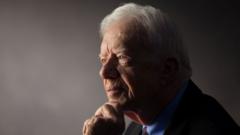In the annals of American history, the presidencies of Jimmy Carter and Joe Biden stand as significant, if not contentious, markers of time. Despite the forty-four years that separate Carter's departure from office and Biden's current tenure, a remarkable array of challenges resonate through the decades, revealing that many of the dilemmas of the late 1970s have returned in different forms just as the political landscape navigates the complexities of 2024.
During the late 1970s, the United States was embroiled in a crisis of confidence, grappling with economic difficulties domestically and overlapping foreign policy trials. Fast forward to today, and similar themes emerge—be it economic instability, environmental crises, or geopolitical tensions involving powerhouses like Russia and China.
Carter's notable diplomatic accomplishment, the Camp David Accords, brought fleeting hope for peace between Egypt and Israel. However, his presidency bore significant challenges, such as the Iranian hostage crisis that tarnished his foreign policy legacy. For Biden, the tumultuous withdrawal from Afghanistan serves as a contemporary parallel, a stark reminder of the limits of American power and its implications for international credibility.
Both presidents have faced immense dilemmas: Carter contended with the Soviet invasion of Afghanistan, while Biden has sought to unite Western allies against the Russian invasion of Ukraine. In both instances, the perceived inadequacies to influence regional dynamics have drawn public scrutiny. The ongoing chaos in the Middle East, particularly in light of the recent Gaza crisis, underscores the persistent complexities that both leaders have navigated on the international stage.
Domestically, both administrations have been challenged by economic strife. Carter faced rampant inflation, and concurrent issues seem echoed in Biden's current economic climate, compounded by the ramifications of the Covid pandemic and international conflicts. While job growth offers a slight counterbalance to rising consumer prices today, the specter of inflation remains a potent political weapon against Biden, reminiscent of voter sentiments during the Carter years.
Perhaps most poignantly, both leaders have had to grapple with waning public trust in government. Carter famously expressed a "crisis of confidence" in 1979, recognizing the growing skepticism among Americans regarding governmental capabilities. Today, Biden faces a similar landscape, with trust in governmental institutions plummeting, particularly amid political polarization and societal unrest.
The contrasting personal styles of Biden and Carter further underline their unique presidencies. Where Carter worked to simplify the image of the presidency, displaying humility, Biden's has been characterized by the polarizing dynamics of modern American politics, somewhat reminiscent of former President Donald Trump’s brash approach. Their post-presidency approaches also stand in stark contrast, as Carter shifted focus to humanitarian efforts post-White House, while Trump remains deeply embroiled in political battlegrounds.
History often rhymes, and the challenges faced by Biden today echo those that plagued Carter's time in office. As citizens reflect on this juxtaposition, a nuanced understanding of leadership and resilience emerges—even amid crises that seem painfully unending across generations. The narratives of both leaders illuminate how much has changed along with the haunting realization of what remains constant in the American political landscape.

















